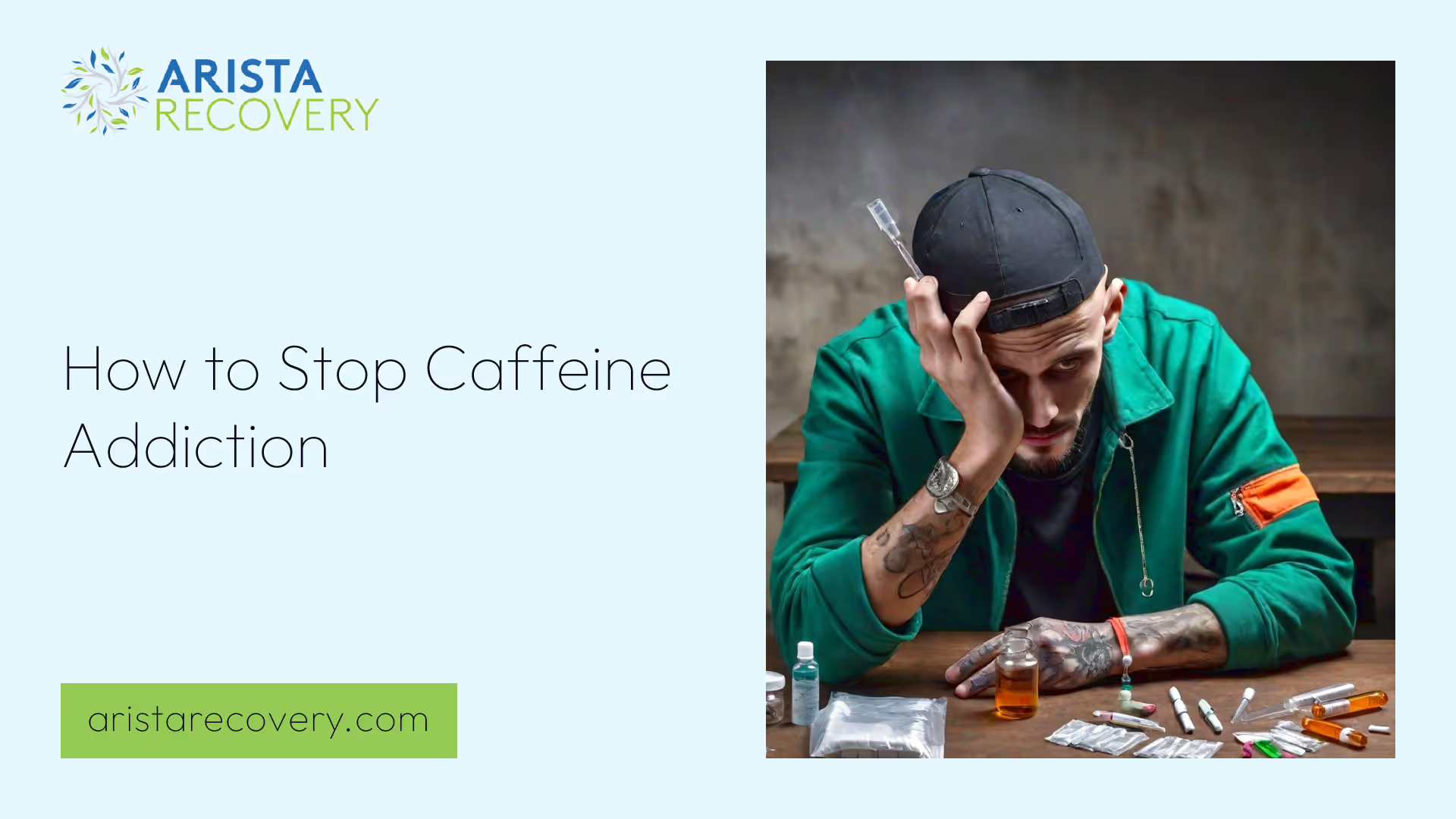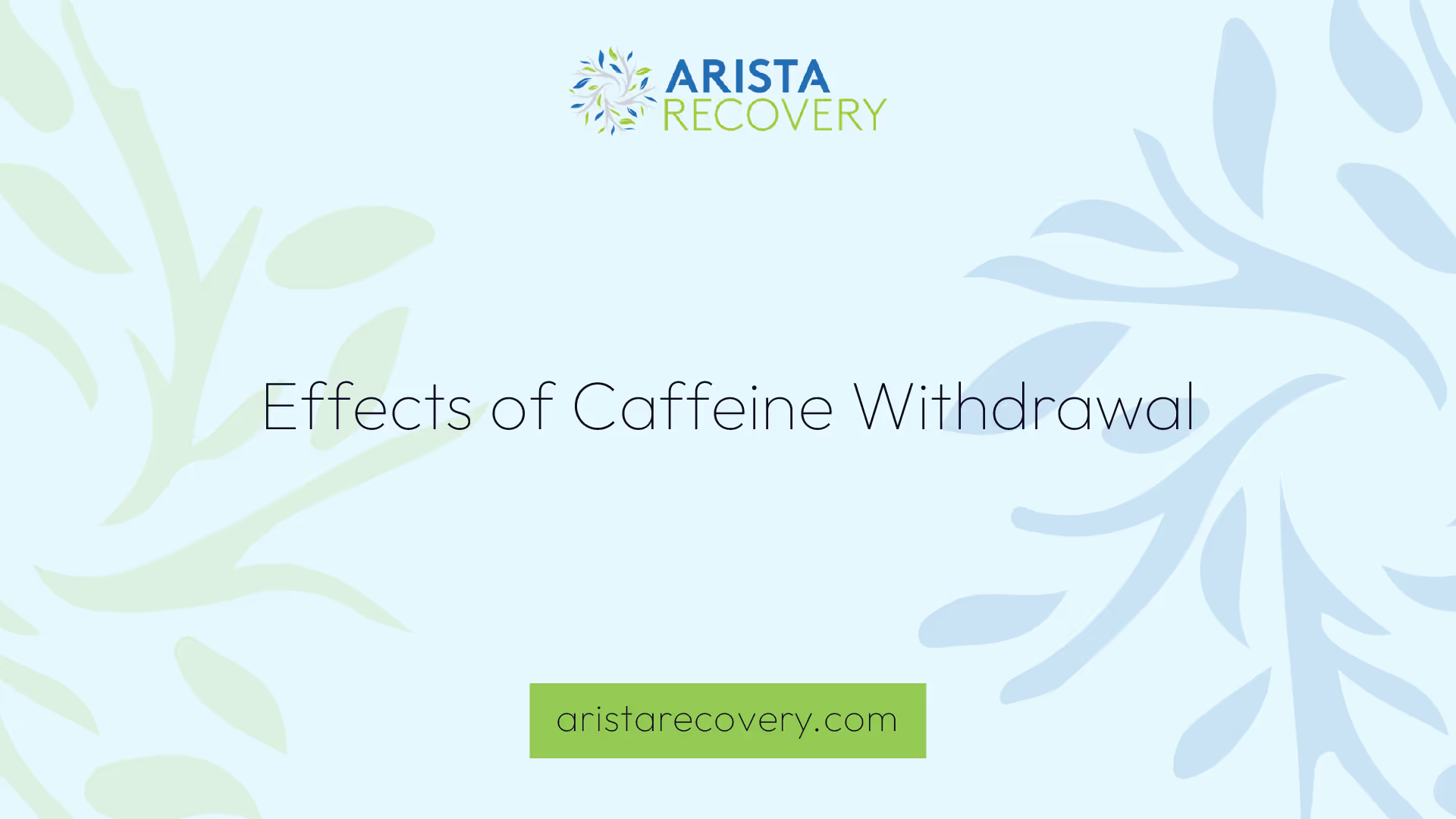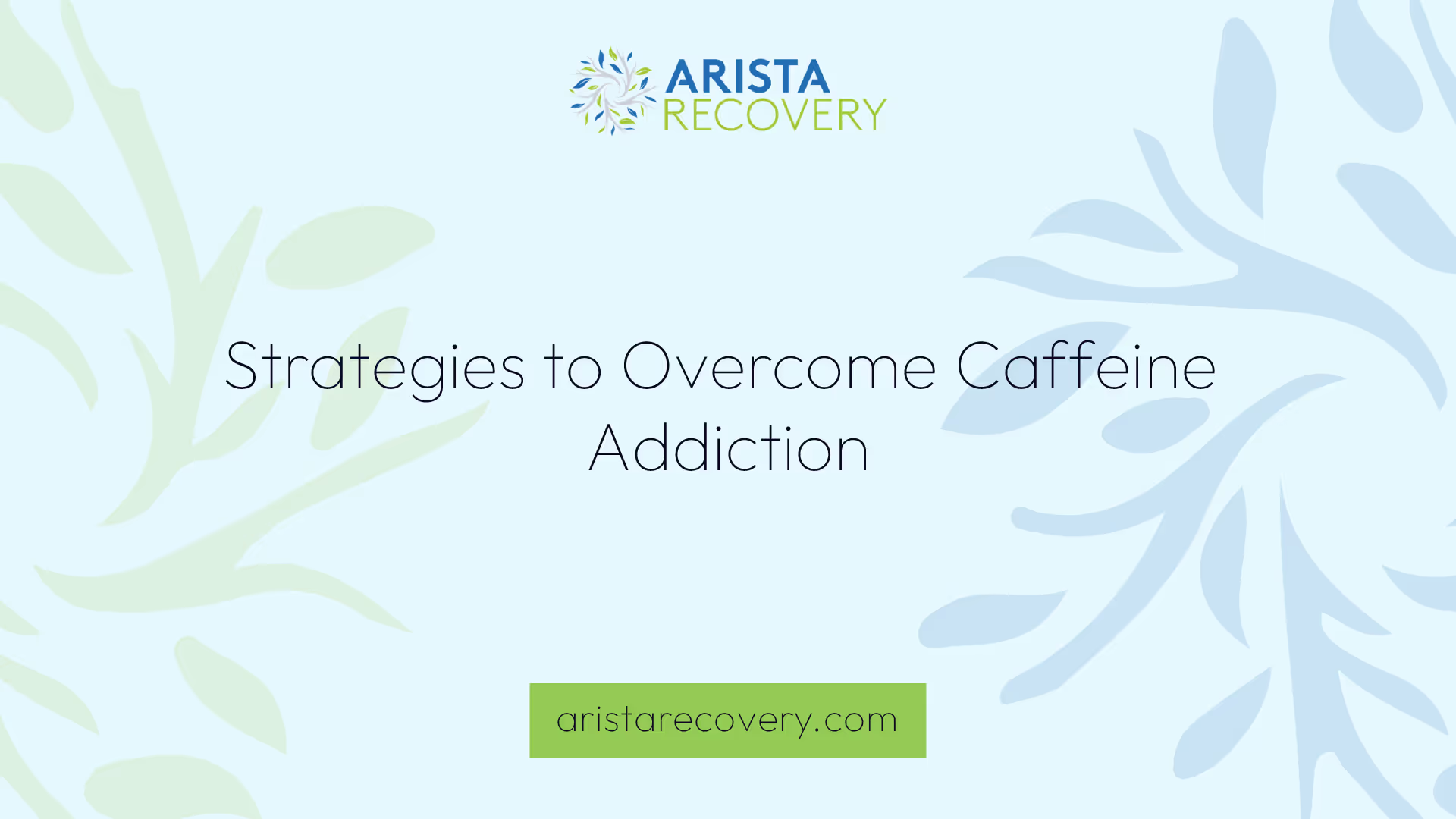How to Stop Caffeine Addiction


Understanding Caffeine Addiction
Caffeine addiction is a prevalent issue that affects a significant portion of the population. It involves the habitual consumption of caffeine, leading to dependence and various negative consequences.
Impact of Caffeine Addiction
Caffeine is the most commonly used stimulant worldwide, with over 90% of adults in the United States consuming it regularly [1]. This widespread use leads to a potential risk of addiction, characterized by cravings and withdrawal symptoms when intake is reduced or ceased [2].
The impact of caffeine addiction can be significant. It can disrupt daily life, making it difficult for individuals to stop consuming caffeine despite being aware of its negative effects. This addiction can lead to:
- Increased Tolerance: Over time, the body becomes accustomed to caffeine, requiring higher doses to achieve the same level of alertness [3].
- Physiological Dependence: Dependence on caffeine can lead to withdrawal symptoms such as tiredness, headaches, and irritability when intake is reduced or stopped.
- Negative Health Consequences: Higher doses of caffeine can lead to various health issues, including insomnia, increased heart rate, and anxiety.
Signs of Caffeine Dependence
Recognizing the signs of caffeine dependence is essential for addressing the issue effectively. Some common indicators include:
- Cravings: A strong desire to consume caffeine, often leading to the inability to start the day without it.
- Inability to Reduce Consumption: Despite being aware of the negative effects, individuals find it challenging to cut down or stop caffeine intake.
- Withdrawal Symptoms: Experiencing symptoms such as headaches, fatigue, and irritability when not consuming caffeine.
- Increased Tolerance: Needing larger amounts of caffeine to achieve the same stimulating effects.
Understanding these signs can help individuals and families impacted by substance use receive the best care and support. For more information on overcoming addiction, visit our related articles on how to stop social media addiction, how to stop video game addiction, and how to stop eating addiction.

Effects of Caffeine Withdrawal
Duration of Caffeine Withdrawal
Caffeine withdrawal can vary in duration depending on several factors, including the amount of caffeine typically consumed and how an individual's body processes caffeine. For most people, caffeine withdrawal lasts between 2 and 9 days. Symptoms generally start around 12 to 24 hours after the last dose of caffeine and can persist for up to two weeks [4].
Common Withdrawal Symptoms
Caffeine withdrawal can manifest in various physical and psychological symptoms. Understanding these symptoms can help individuals prepare and manage their withdrawal journey effectively.
These symptoms can be challenging, but there are strategies to cope with them. Gradually reducing caffeine intake, staying hydrated, and incorporating exercise can help alleviate withdrawal symptoms. For more tips on managing withdrawal, visit our section on how to stop addiction. If you're struggling with withdrawal, consider consulting a healthcare provider for personalized advice and support.

Strategies to Overcome Caffeine Addiction
Successfully overcoming caffeine addiction requires a well-thought-out strategy. Here are some effective methods to help break free from caffeine dependence.
Gradual Reduction of Caffeine Intake
Gradually lowering caffeine intake is recommended to cope with caffeine addiction and manage withdrawal symptoms. This approach helps to prevent shocking the system and reduces the likelihood of experiencing severe withdrawal symptoms [5].
To gradually reduce caffeine consumption, try the following steps:
- Assess Current Intake: Note the number of caffeinated beverages consumed daily.
- Substitution: Replace one cup of caffeinated coffee with decaf or a caffeine-free alternative each week [6].
- Blending: Mix regular coffee with decaf to slowly lower the caffeine content.
- Reduce Frequency: Decrease the number of caffeinated drinks consumed per day over a few weeks [3].
Following a structured plan can make the process more manageable and increase the chances of success.
Alternative Energy-Boosting Methods
Finding alternative ways to boost energy can help reduce dependence on caffeine. Here are some effective methods:
- Exercise: Regular physical activity can naturally increase energy levels and improve overall well-being. Exercise releases endorphins, which can help combat fatigue and boost mood.
- Hydration: Staying hydrated is crucial for maintaining energy levels. Drinking plenty of water throughout the day can help alleviate symptoms of caffeine withdrawal.
- Balanced Diet: Consuming a diet rich in fruits, vegetables, whole grains, and lean proteins can provide sustained energy. Avoiding sugary snacks and processed foods can prevent energy crashes.
- Herbal Supplements: Supplements like panax ginseng and vitamin B complex can help ease the transition off caffeine [3]. They can support energy levels and reduce fatigue.
- Sleep Hygiene: Ensuring adequate sleep and maintaining a consistent sleep schedule can improve daytime energy and reduce the need for caffeine.
By gradually reducing caffeine intake and exploring alternative energy-boosting methods, individuals can successfully overcome caffeine addiction. For more information on related topics, check out our articles on how to stop social media addiction, how to stop video game addiction, and how to stop eating addiction.
Coping with Caffeine Withdrawal Symptoms
Exercise as a Supportive Measure
Exercise can be a highly effective method for managing the symptoms of caffeine withdrawal. Physical activity stimulates the body and mind in ways similar to caffeine, making it an excellent substitute during the withdrawal process. Engaging in regular exercise can help alleviate withdrawal symptoms such as headaches, fatigue, and mood changes, which typically start around 12 to 24 hours after the last caffeine dose and may last between two to nine days [2].
Regular exercise boosts endorphin levels, improving mood and energy levels. It also enhances blood circulation, which can reduce the severity of withdrawal headaches. Aiming for at least 30 minutes of moderate exercise, such as walking, jogging, or cycling, can make a significant difference in coping with withdrawal symptoms.
For more strategies on overcoming substance use, check out our articles on how to stop social media addiction and how to stop video game addiction.
Hydration for Symptom Alleviation
Staying hydrated is crucial when dealing with caffeine withdrawal. Drinking plenty of water helps alleviate several common withdrawal symptoms, including headaches and constipation. Proper hydration ensures that the body functions optimally and can help flush out residual caffeine from the system, aiding the detox process [5].
It's recommended to drink at least eight 8-ounce glasses of water a day. Adding electrolyte-rich beverages like coconut water can also be beneficial. Additionally, herbal teas can serve as a comforting and hydrating alternative to caffeinated beverages.
For more tips on managing substance use and its effects, explore our articles on how to stop sex addiction and how to stop eating addiction.
By incorporating regular exercise and maintaining proper hydration, individuals can better manage the challenging symptoms of caffeine withdrawal and make strides toward breaking free from caffeine dependence.
Seeking Professional Help
Overcoming caffeine addiction can be challenging, and seeking professional assistance can provide the necessary support and guidance. Consulting healthcare providers and accessing supportive resources are pivotal steps in effectively managing and overcoming caffeine dependence.
Importance of Consulting a Healthcare Provider
Consulting a healthcare provider is crucial for individuals struggling with caffeine addiction. Healthcare professionals can offer personalized advice, monitor progress, and provide medical support if needed. They can also help differentiate caffeine addiction from other behavioral or substance use disorders, such as anxiety, attention deficit disorders, and mood disorders, which may overlap with caffeine dependence.
A healthcare provider can:
- Assess the severity of caffeine dependence.
- Develop a tailored plan to gradually reduce caffeine intake.
- Monitor withdrawal symptoms and manage any complications.
- Provide prescriptions for medications if necessary to alleviate withdrawal symptoms.
According to Healthline, the first step in addressing caffeine addiction is to speak with your doctor about reducing your caffeine dependence. This professional guidance is especially important since caffeine is a widely consumed stimulant and one of the most commonly abused addictive substances.
Supportive Resources for Caffeine Addiction
In addition to consulting healthcare providers, various supportive resources can aid in managing caffeine addiction. These resources include support groups, educational materials, and online tools designed to provide information and encouragement throughout the recovery process.
It's important to utilize these resources to stay informed and motivated. Engaging with a community of individuals facing similar challenges can provide valuable insights and emotional support.
For those seeking further information on overcoming various forms of addiction, our other articles such as how to stop social media addiction, how to stop video game addiction, and how to stop sex addiction may also be helpful.
By leveraging professional help and supportive resources, individuals can effectively manage and overcome caffeine addiction, paving the way for a healthier lifestyle.
Healthy Alternatives to Caffeine
When looking to break free from caffeine addiction, exploring healthy alternatives can be a crucial step. These substitutes not only help in reducing caffeine intake but also offer various health benefits.
Substitutes for Caffeinated Beverages
A variety of beverages can serve as effective alternatives to caffeinated drinks like coffee and energy drinks. Here are some popular options:
- Green Tea and Matcha: Green tea contains about 30 to 50 milligrams of caffeine per 8-oz. serving, making it a milder alternative to coffee. Matcha, a type of powdered green tea, also offers a gentle caffeine boost with additional antioxidants.
- Black Tea: Black tea varieties such as Assam or Darjeeling contain about 25 to 110 mg of caffeine per serving, significantly less than brewed coffee, which ranges between 102 to 200 mg per serving [7].
- Herbal Teas: Beverages like chamomile, peppermint, and rooibos teas are naturally caffeine-free and provide soothing effects without the need for caffeine.
- Caffeine-Free Drinks: Consuming fluids with zero caffeine, such as water, juice, or caffeine-free soda, can help individuals quit coffee while staying hydrated [7].
- Raw Cacao: Raw cacao is a caffeine alternative containing a very small amount of caffeine compared to coffee. It can be used to make hot chocolate or added to smoothies [7].
Benefits of Caffeine-Free Options
Switching to caffeine-free alternatives offers numerous advantages that can support overall health and well-being:
- Improved Sleep: Cutting out coffee helps regulate sleep patterns, leading to better quality sleep and reduced insomnia.
- Reduced Irritability: Less caffeine intake can lower irritability and anxiety levels, contributing to a calmer mood.
- Enhanced Hydration: Consuming caffeine-free beverages like water and herbal teas ensures adequate hydration, which is essential for various bodily functions.
- Balanced Energy Levels: While caffeine provides a temporary energy boost, it often leads to crashes. Caffeine-free options help maintain more stable energy levels throughout the day.
By incorporating these healthy alternatives into daily routines, individuals can successfully reduce their caffeine dependence and enjoy the benefits of a more balanced, caffeine-free lifestyle. For more tips on managing different types of addictions, check out our articles on how to stop social media addiction, how to stop video game addiction, and how to stop eating addiction.
References
[1]: https://www.ncbi.nlm.nih.gov/pmc/articles/PMC3777290/
[2]: https://www.verywellmind.com/caffeine-addiction-4157287
[3]: https://www.sutterhealth.org/health/nutrition/breaking-your-caffeine-habit
[4]: https://southernbreezesweettea.com/blogs/sweetlivin/how-long-does-it-take-to-detox-from-caffeine/
[5]: https://www.health.com/caffeine-withdrawal-7095696
[6]: https://www.cnn.com/2017/10/20/health/caffeine-fix-food-drayer/index.html
[7]: https://www.healthline.com/health/food-nutrition/alternatives-to-coffee
You’re not alone in this.
When mental health challenges and addiction intersect, it can feel isolating. At Arista, we offer compassionate, evidence-based, and trauma-informed care to help you heal, grow, and move forward.
You’re not alone in this.
When mental health challenges and addiction intersect, it can feel isolating. At Arista, we offer compassionate, evidence-based, and trauma-informed care to help you heal, grow, and move forward.
Support that moves with you.
You’ve taken a brave first step. At Arista Recovery, we’re here to help you continue with best-in-class care designed for long-term healing and support.
.webp)






